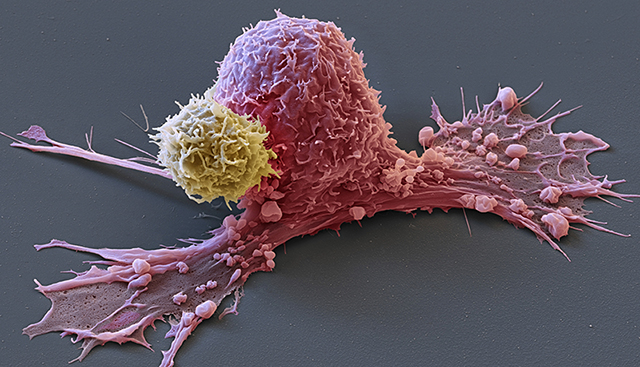
The Future of CAR T for Gynecologic Cancers
Dr. Robert Wenham is a gynecologic oncologist and chair of the Gynecologic Oncology Program at Moffitt Cancer Center. A principal investigator for numerous clinical trials to improve cancer care for women, Dr. Wenham's research activities include the use of novel drugs for the treatment of gynecologic cancers. He has received the Molly Cade Ovarian Cancer Research Award from the Gynecologic Cancer Foundation.
Dr. Wenham answers five questions about the future of CAR T for gynecologic cancers.
What are some advantages of CAR T cell therapy for gynecologic cancers?
Current therapies have extended life but have not seemed to improve the cure rate. We may finally find the way to use the immune system to break this elusive barrier. Immunotherapy has been a big breakthrough for some cancers. Being able to translate the personalized therapies, like CAR T, for ovarian could help save thousands of patients each year.
Where are we with the ability to use CAR T therapy for solid tumors, particularly ovarian cancer?
Ovarian cancers may be molecularly heterogeneous, but they do have certain epitopes that are commonly expressed and can be exploited for targets. A team of researchers led by Moffitt’s Immunology Department has developed a CAR that introduces Follicle Stimulating Hormone (FSH) into T cells. Moffitt has partnered with ITUS Corporation to help bring this new CAR T therapy to patients. An investigational new drug application is pending FDA approval. If approved, the therapy could begin human clinical trials in 2021.
What is Follicle Stimulating Hormone (FSH) CAR T?
Follicle Stimulating Hormone (FSH) CAR T are specific immune cells engineered to target an endocrine receptor that is found almost exclusively on many ovarian cancers. We are building on the preclinical work of Dr. Jose Conejo-Garcia, chair of Moffitt’s Immunology Department, and will be testing this exciting target starting 2021. (Dr. Wenham will lead the clinical trials.)
What is CERT (endocrine CAR T) cellular therapy?
CERT designates the target on the cancer cell to be an endocrine receptor. It is otherwise identical to other CAR T. Moffitt is developing a first in human Chimeric Endocrine Receptor T-cell (CERT) study for patients who have ovarian cancer. The plan is for a clinical trial to begin soon.
When will clinical trials be available for either FSH or endocrine CAR T?
First in human clinical trials for both FSH and endocrine CAR T will start in 2021. Ovarian cancer is difficult to treat because many patients are not diagnosed until they are in the later stages of disease progression. Despite advances in surgery and chemotherapy, there are enormous opportunities to improve survival. Our team looks forward to beginning our clinical trials and bringing this therapy to patients.
To learn more about the Gynecologic Oncology program or to refer a patient to Moffitt, complete our online form or contact a physician liaison for assistance or support.
